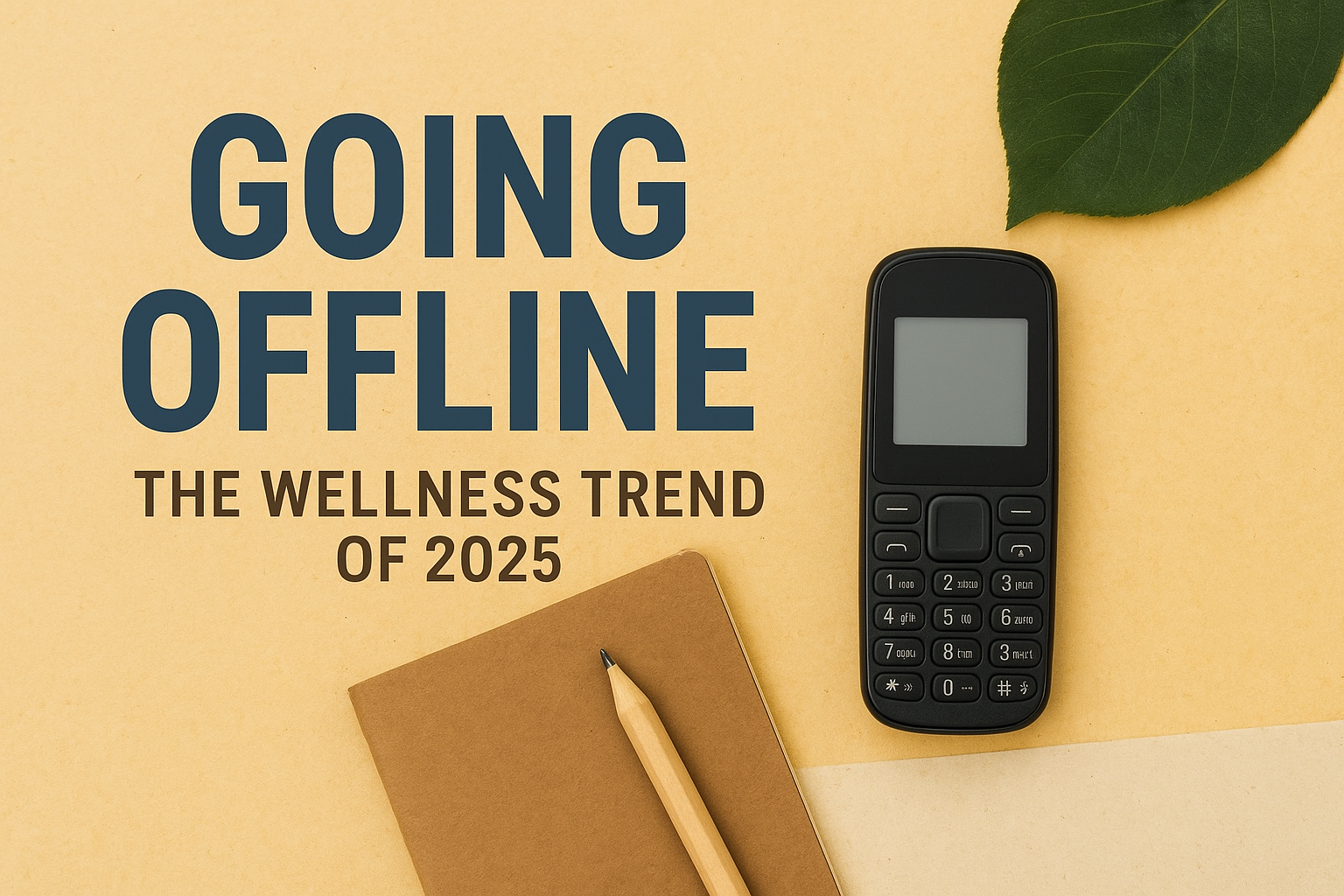Introduction
In a hyper-connected world where every buzz, ping, and notification demands our attention, the boldest act of rebellion in 2025 is surprisingly simple: going offline. From celebrities like Ed Sheeran and Kate Beckinsale switching to old-school flip phones, to young professionals signing up for “screen-free retreats,” offline living is no longer nostalgia—it’s a full-blown wellness trend.
Mental health experts are warning that excessive screen time is fueling anxiety, poor sleep, and even lower self-esteem across generations. As the digital noise grows louder, many are choosing to step back—embracing dumb phones, journaling, and real-world connections. This blog explores why unplugging is the new self-care, the benefits it brings, and how you can start your own offline journey in 2025.
Why Going Offline Hits Different in 2025
Digital detox is not a new concept, but its urgency in 2025 is unprecedented. With work, entertainment, and even social interactions glued to screens, the average person spends 7+ hours a day online. Doctors warn this is directly linked to:
- Higher levels of stress and anxiety
- Sleep disorders caused by blue light exposure
- Declining focus and attention spans
- Feelings of loneliness despite constant connectivity
The offline movement is about reclaiming control—choosing when and how technology enters our lives, instead of being at its mercy.
Benefits of Disconnecting
Switching off—even for a few hours a day—has significant mind-body benefits:
- Improved sleep: Logging off before bed helps restore natural circadian rhythms.
- Lower stress: Disconnecting reduces mental fatigue and sensory overload.
- Better focus & productivity: Less scrolling means more time for meaningful work.
- Deeper relationships: Offline moments encourage genuine, face-to-face connections.
- Mental clarity: Screen-free time fosters creativity and mindful reflection.
Experts recommend introducing small offline rituals like screen-free meals or device-free commutes to experience these benefits without drastic lifestyle shifts.
How to Start Your Offline Wellness Journey
Going offline doesn’t mean becoming a hermit. It’s about balance. Here are some practical ways to begin:
- Swap your smartphone for a dumb phone (or use both). Dumb phones allow calls and texts but eliminate constant notifications and app addiction.
- Schedule screen-free blocks: Start with 30 minutes daily—at meals, before bed, or during morning routines.
- Try analog hobbies: Journaling, sketching, gardening, or reading printed books.
- Reclaim weekends: Dedicate one day (or evening) a week to offline activities like hiking, board games, or cooking with family.
- Digital-free social gatherings: Encourage friends to leave phones in a basket at meetups.
Spotlight: Dumb Phones—Minimalism Meets Wellness
Once dismissed as outdated, dumb phones are making a comeback. These minimalist devices offer calling, texting, and sometimes basic maps or music—without addictive social media apps.
Why people love them:
- Reduce distraction and dopamine-driven scrolling.
- Improve focus and intentional communication.
- Offer a sense of freedom: no buzzing notifications, no endless feeds.
Even tech enthusiasts are adopting dumb phones as a “second phone”—keeping one for work, and one for personal peace of mind.
Common Concerns (and Solutions)
- “I’ll miss urgent messages” → Use dual setups: keep a smartphone at home for work apps, and carry a dumb phone on weekends.
- “What about emergencies?” → Dumb phones still allow calls and SMS, ensuring safety.
- “I need my calendar & maps” → Many dumb phones now come with basic utilities, or use a hybrid setup (smartphone in airplane mode).
- “Will I lose touch with friends?” → Going offline isn’t isolation—it’s about intentional connection on your terms.
FAQs
Q1. What is a dumb phone and why are people choosing it?
A dumb phone is a simple mobile device offering basic functions like calling and texting. People are choosing them to reduce distractions, regain focus, and support mental well-being.
Q2. How does digital detox improve mental health?
Digital detox reduces exposure to constant stimuli, helping to lower stress, improve sleep, and restore attention spans.
Q3. Can I realistically use a dumb phone in 2025?
Yes—many users carry dumb phones as primary or secondary devices. With growing popularity, manufacturers now design sleek, modern versions that balance minimalism and functionality.
Q4. How long before I see benefits of going offline?
Even a week of reduced screen time can improve sleep and focus. Long-term habits amplify benefits, creating sustainable lifestyle change.
Final Thoughts
In 2025, going offline is more than nostalgia—it’s a wellness revolution. From dumb phones to screen-free weekends, millions are discovering that less tech often means more life.
If you feel drained by constant scrolling, maybe it’s time to try a small detox. Start with one screen-free meal, or experiment with a dumb phone weekend. You might just rediscover mental clarity, stronger relationships, and real freedom.

Leave a Reply